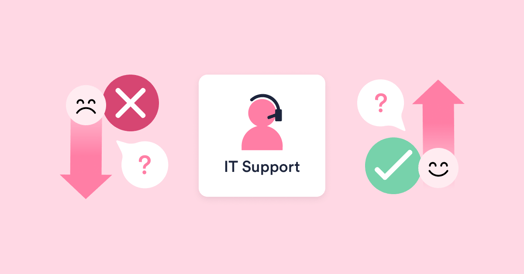What’s more important for your IT service desk – getting a great piece of customer feedback or not getting any bad pieces of feedback? Hopefully, you can see the difference between the two – the latter is about “not failing,” while the former is about “succeeding.” This blog considers whether traditional IT service desk performance metrics cause us to avoid failure more than they encourage us to succeed. Think about it – how many IT service desk metrics involve just scraping past a target (that the customer wished was higher)? And are employees and customers happy with the quality of IT support even when every single IT service desk target is met?
Using periodic employee performance reviews as an analogy
Consider this similar to how you, and perhaps your direct reports, undertake periodic employee performance reviews. Do you start everyone off at zero and add points based on the good they do during the year? Or do you start everyone off at 100 and subtract points every time they make a mistake or fail to deliver on something? In my experience, the latter method seems more prevalent than it should be – because we focus on, and remember, the bad stuff. It means that people are perhaps more motivated not to make mistakes than to take risks in pursuit of doing great or even exceptional things.
Bringing this back to IT support, do traditional IT service metrics encourage people to “not make mistakes” – or even simply to not fall foul of performance targets such as average handling time – rather than doing the best they can do in helping those that they serve?
It also doesn’t help that the first time an employee hears about how performance is viewed – based on that period – is at the end of the month. Or, even worse, at the end of the quarter, half-year, or year.
How are your IT service desk motivation levels?
In a previous blog, Using Experience Feedback to Up IT Service Desk Analyst Motivation, I wrote about better motivating service desk analysts through more meaningful work. Something that positively impacts the delivered employee (end-user) experience and the analyst experience.
It’s a much-needed improvement given the continued “negativity” of the IT support, and broader IT, environments as depicted in the ITSM.tools well-being in IT survey, which identified that:
- 88% of respondents think working in IT will get harder over the next three years.
- Only 27% of respondents feel that their efforts and value are sufficiently recognized by management, versus 71% of respondents who feel “undervalued” to some extent.
- Two-thirds of respondents feel that working in IT is adversely affecting their personal well-being.
Where the performance measurement system ultimately plays a part in this demotivation.
Driving the right service desk analyst behaviors through better performance metrics
Our IT service desk analysts are really up against it:
- They spend all day dealing with people who have issues – either something needs fixing or providing – and contact/ticket volumes are increasing
- They’re potentially in an environment that wants to avoid failure more than it wants to succeed – it’s a perpetual case of “looking over one’s shoulder”
- The corporate performance management system and their line manager probably remember their mistakes over their successes
- They aren’t recognized for their hard work (as per the above well-being stats)
- End-user expectations are continually rising thanks to employees’ often-better consumer-world experiences of service and support
- Despite the growing work volumes, there’s probably an IT service desk strategy to reduce costs.
Not only does this potentially demotivate IT support staff, it actively encourages them to seek employment elsewhere – industry recruitment and retention stats show this. This is yet another barrier to your IT service desk meeting the expectations your organization and its employees have of it.
Employee experience management can help
“How?” I hear you cry.
First, it allows for a more positive approach that provides specific details and a good level of understanding of what’s working well and not to offer up a platform for your IT service desk to improve both aspects of performance.
For example, HappySignals customer data up to the end of 2022 highlighted that the top three contributing factors for employee happiness with incident handling were:
- Speed of service
- Service personnel’s attitude
- Service personnel’s skills.
Whereas unhappy employees highlighted:
- Their issue not being solved despite ticket closure
- Slowness of service
- Having to reexplain the issue and provide details repeatedly, i.e. being bounced between people.
Second, individual service desk analysts get near-real-time feedback on their performance. They get to see both positive and negative feedback. Plus, the positive feedback is immediate recognition and can be brought into the ongoing performance review process.
Third, thanks to net promoter score (NPS)-style scoring, doing just enough is no longer enough.
There are other ways in which employee experience management can help here – please get in touch with me if you want to hear them. My point is that using employee experience management is not only driving up how employees feel about IT support but also changing the IT service desk’s perspective of its purpose and operation. Understanding that happier employees make for lower levels of employee lost productivity which in turn leads to better business outcomes. To provide an environment where service desk analysts feel motivated and can be recognized for higher performance levels.
Hopefully, this article has you thinking about whether your IT service desk should be seeking to succeed rather than simply trying to avoid failure. And your IT support staff deserve to be recognized for their successes, not just their mistakes. Ultimately, do you want people to proactively state that they had a good experience (with IT support) or just not to moan that they had a bad one? Because an absence of complaints doesn’t necessarily mean that you’ve done a good job, let alone a great one. Nor does it mean that you’re not haemorrhaging IT support customers.
If you want to find out more about how employee experience management can help please contact us.




